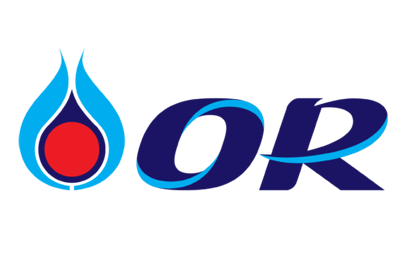
Importance
The business activities of OR’s suppliers may have both positive and negative impacts on the economy, the environment, and surrounding communities. Due to the diversification of OR’s business activities, the risks associated with suppliers manifest in various forms. For example, in the petroleum product group, collaboration with transportation suppliers for petroleum products may impact communities if there are inadequate safety standards in transportation. On the other hand, the Café Amazon business group collaborates with agricultural suppliers cultivating coffee beans. This collaboration may have negative environmental impacts if coffee cultivation affects biodiversity, or positive impacts on local employment. While these impacts may not directly result from OR’s business activities, OR recognizes our role as a purchaser with the ability to promote sustainability throughout the supply chain.
Therefore, OR aims to promote sustainable supply chains through the integration of environmental, social, and good governance (ESG) standards into its procurement and supply chain management policies. OR is committed to ensuring that its business operations throughout the supply chain do not result in adverse impacts on communities, society, and the environment.
In addition to promoting the organization’s sustainability goals, OR recognizes the importance of managing the supply chain to create business opportunities for various entrepreneurs under the “S – SMALL” strategy, which is part of OR’s SDG framework.
2024 Targets
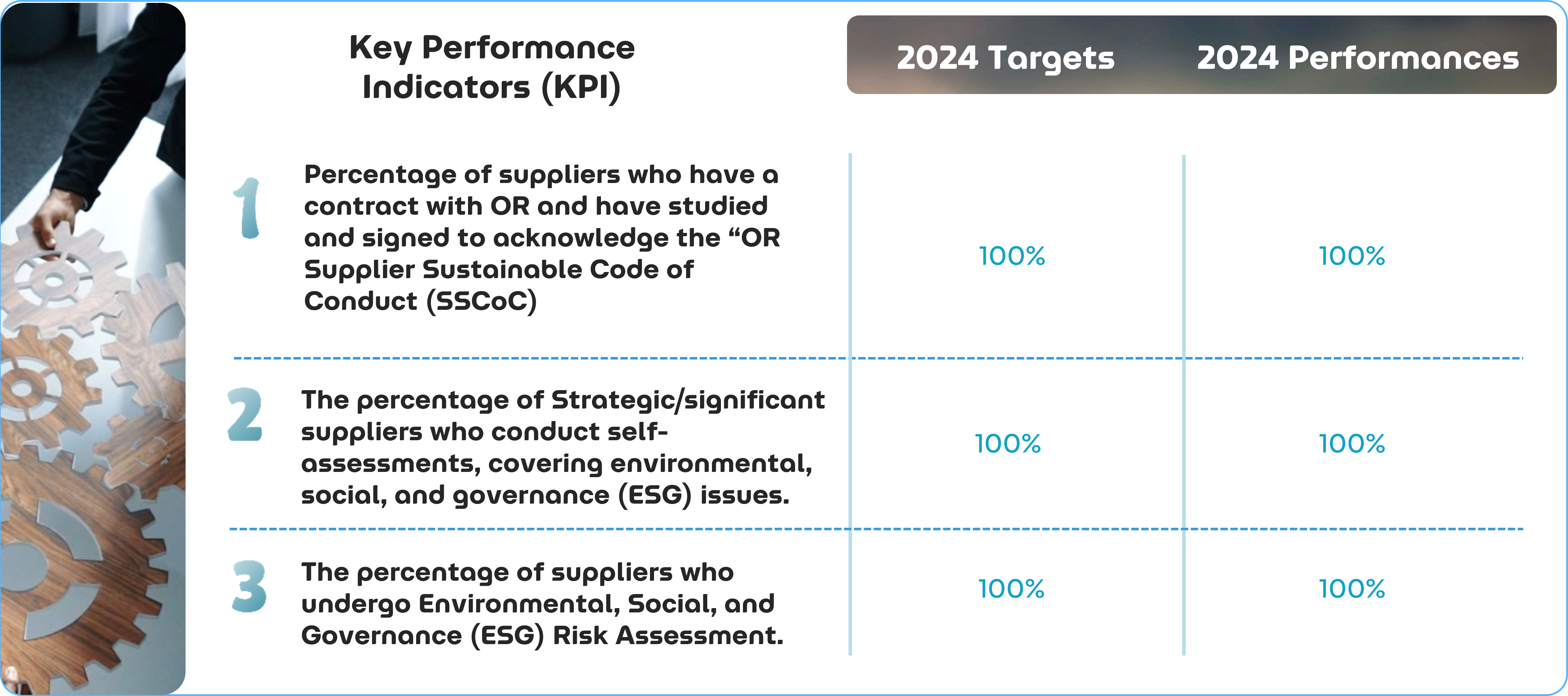
Management Approach
Procurement Policy
OR has declared the Company’s commitment to integrate environmental, social, and governance (ESG) considerations in our procurement activities through the Procurement Policy, which is embedded in the 2024 OR Group Way of Conduct. Details of the Procurement Policy are outlined on page 72 of the 2024 OR Group Way of Conduct. Click for more information
Supplier Sustainable Code of Conduct
OR has established the OR Supplier Sustainable Code of Conduct (SSCoC) to specify the standards that OR’s suppliers should adhere to throughout their business operations. This includes ethical business practices, social responsibility, safety, and environmental management. OR communicates the details of the Supplier Sustainable Code of Conduct (SSCoC) to every supplier through electronic communication and integrating the Supplier Sustainable Code of Conduct as part of the annual supplier training.
Currently, OR has implemented the SAP Ariba system in its procurement and supplier registration process. All suppliers who wish to submit proposals must read and acknowledge the OR Suppliers Sustainable Code of Conduct (SSCoC) during the OR supplier registration process before they are eligible to participate in the bidding.
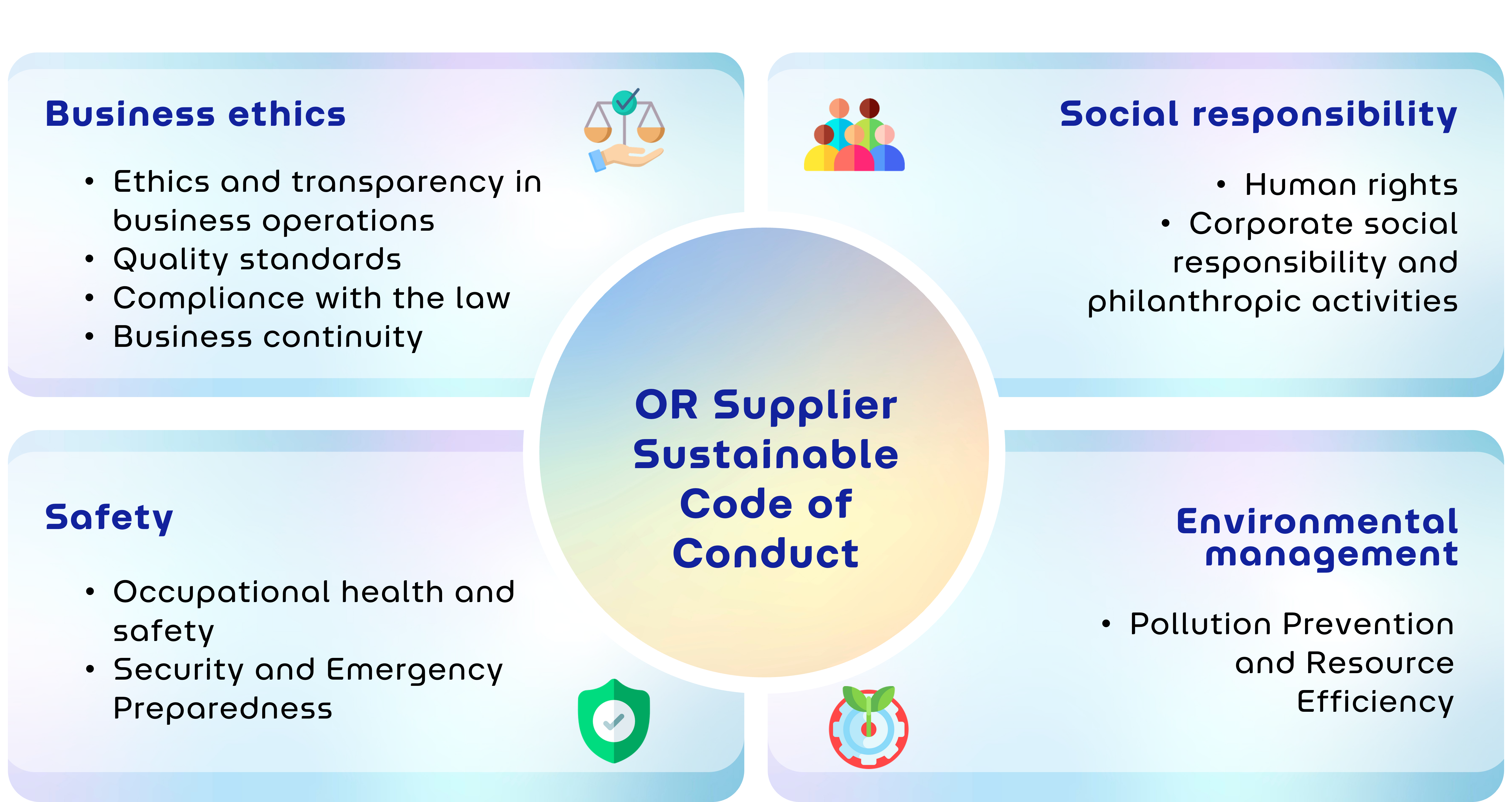
In 2024, all suppliers have acknowledged and certified the OR Supplier Sustainable Code of Conduct: OR Supplier Sustainable Code of Conduct for download
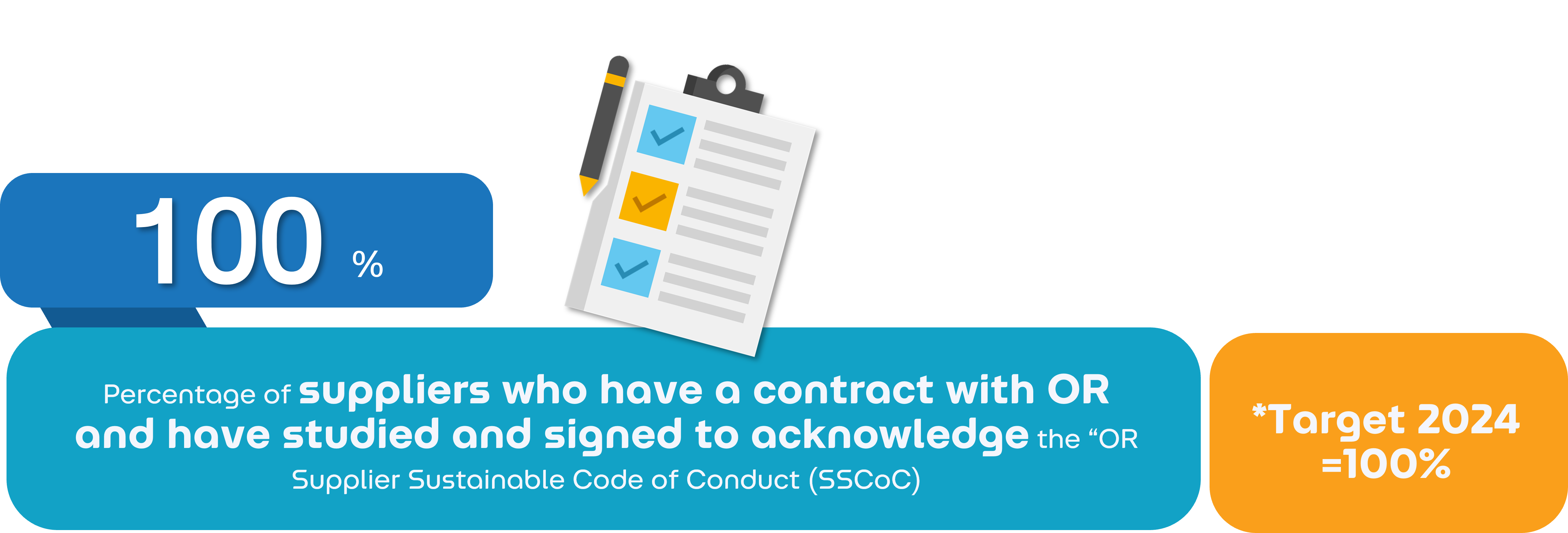
Supply Chain Management Strategy: SCM Strategy
The Company’s Board of Directors has established the direction and oversight of the ESG supply chain management strategy for suppliers to ensure that the procurement process aligns with the organization’s business policies and strategies. The strategy includes 5 key components, including:
- Perceptibility: Commit to promote supplier awareness and recognition of related requirements, rules, and regulations related to business operations, including expectations regarding transparency in procurement procedures.
- Cost Effectiveness: Promote procurement processes that are cost-effective and appropriate to the quality of products and services received.
- Centralized and Digitalized Approach: Prioritize centralized supply chain management to standardize operations across all business groups. and develop more digital interactions between OR and suppliers.
- ESG Risk Management: Controls the business operation of suppliers to ensure suppliers have effective ESG risk management measures to support business sustainability.
- Standard of Service and Material: Prescribe the standards of product and service quality to ensure that received products and services meet quality standards and expectations of OR.
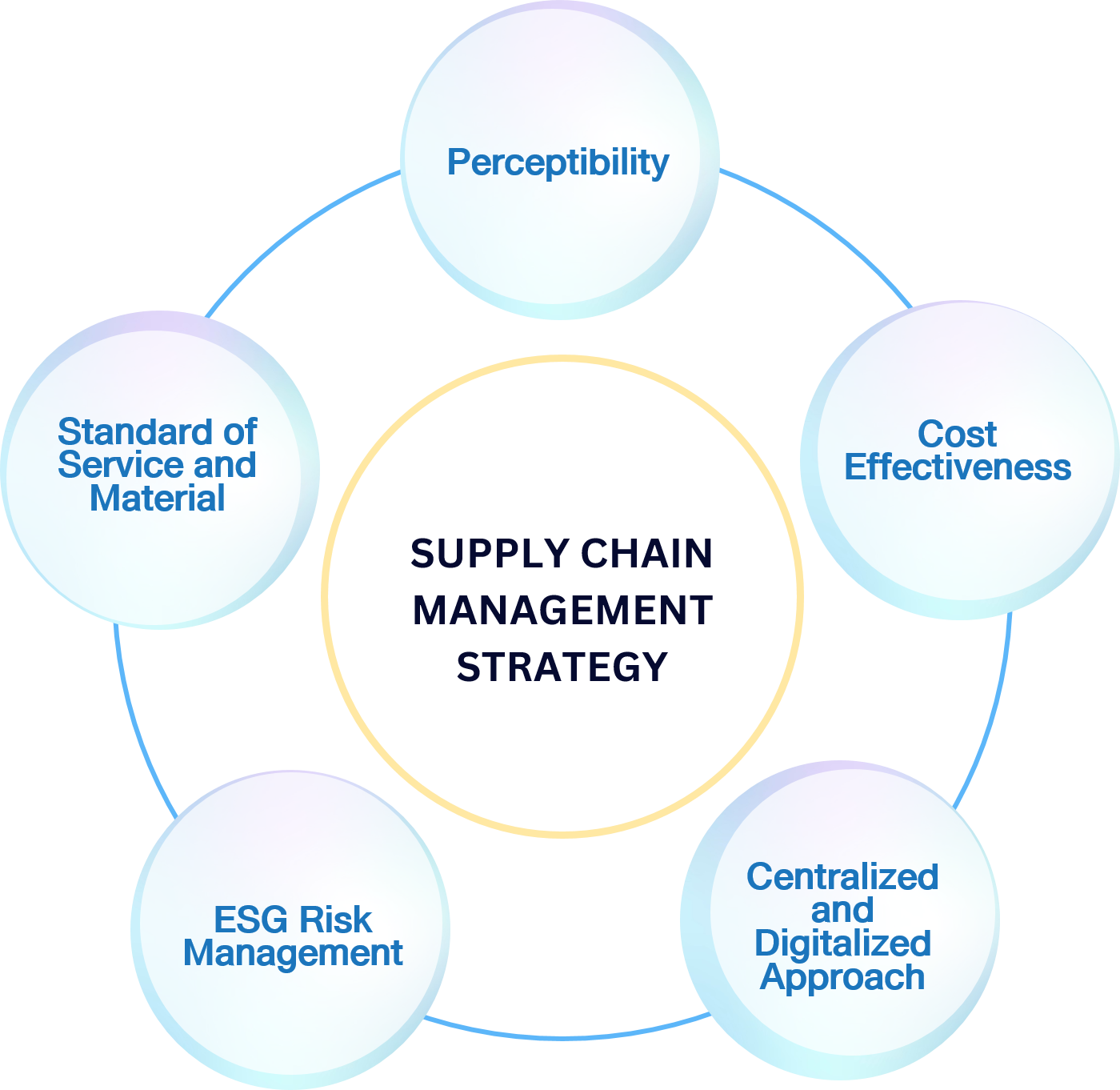
In this regard, OR acknowledges that suppliers cannot effectively implement ESG initiatives without having adequate financial liquidity as a fundamental basis. Therefore, OR specifies the payment terms in the Term Of Reference (TOR) , stating that the payment period shall not exceed 30 days after OR has received the goods/services in full accordance with the contract and the acceptance committee has inspected and approved the delivery for each installment.
The performance results for 2024 achieve the target:
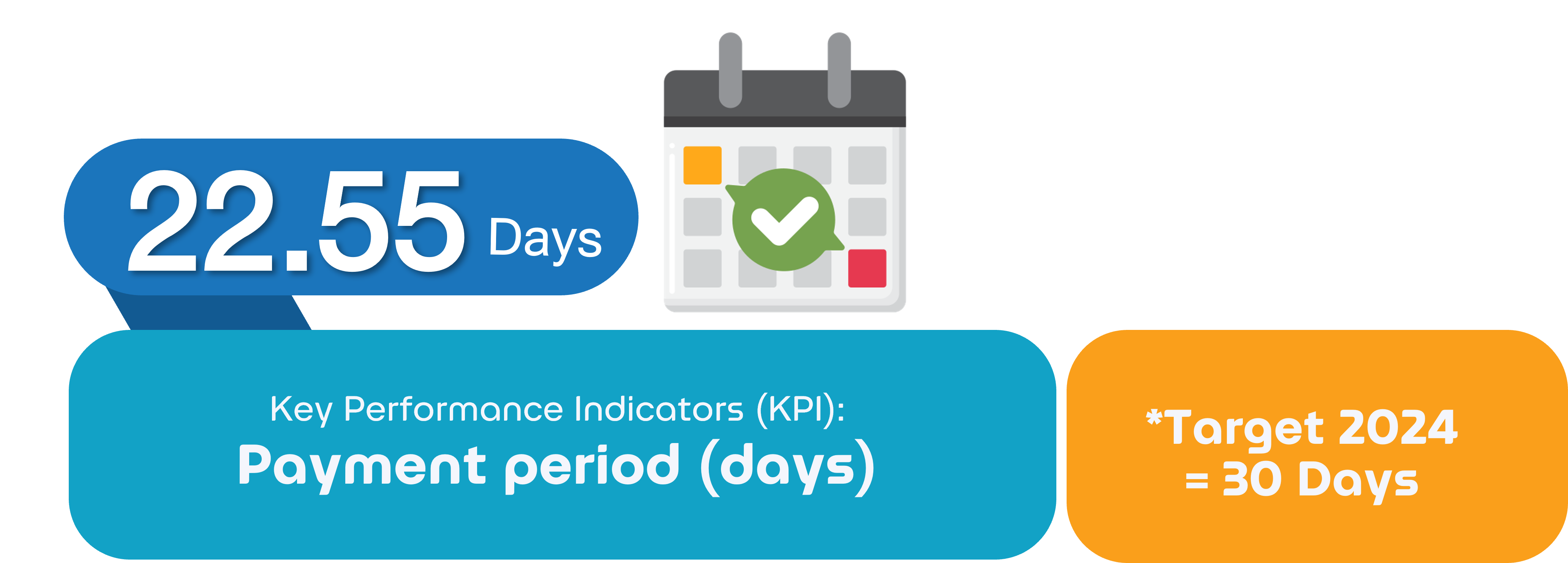
Supplier Management Overview
OR’s suppliers are categorized according to OR’s 5 main business groups along the Value Chain. An analysis of suppliers involved in procurement in 2023, revealed that OR has a total of 715 Tier-1 suppliers. The details of the business groups, key examples of suppliers, and procurement values are as follows:
Business Group | Example of Tier 1 Supplier | Procurement Value |
| Petroleum product group |
| 6,371.16 |
| Retail Oil Business Group (PTT Station) |
| 41.55 |
| Lubricant Business Group |
| 94.71 |
| LPG Business Group (excluding LPG) |
| 61.55 |
| Café Amazon Business Group |
| 52.33 |
OR's supplier management process consisting of 6 parts
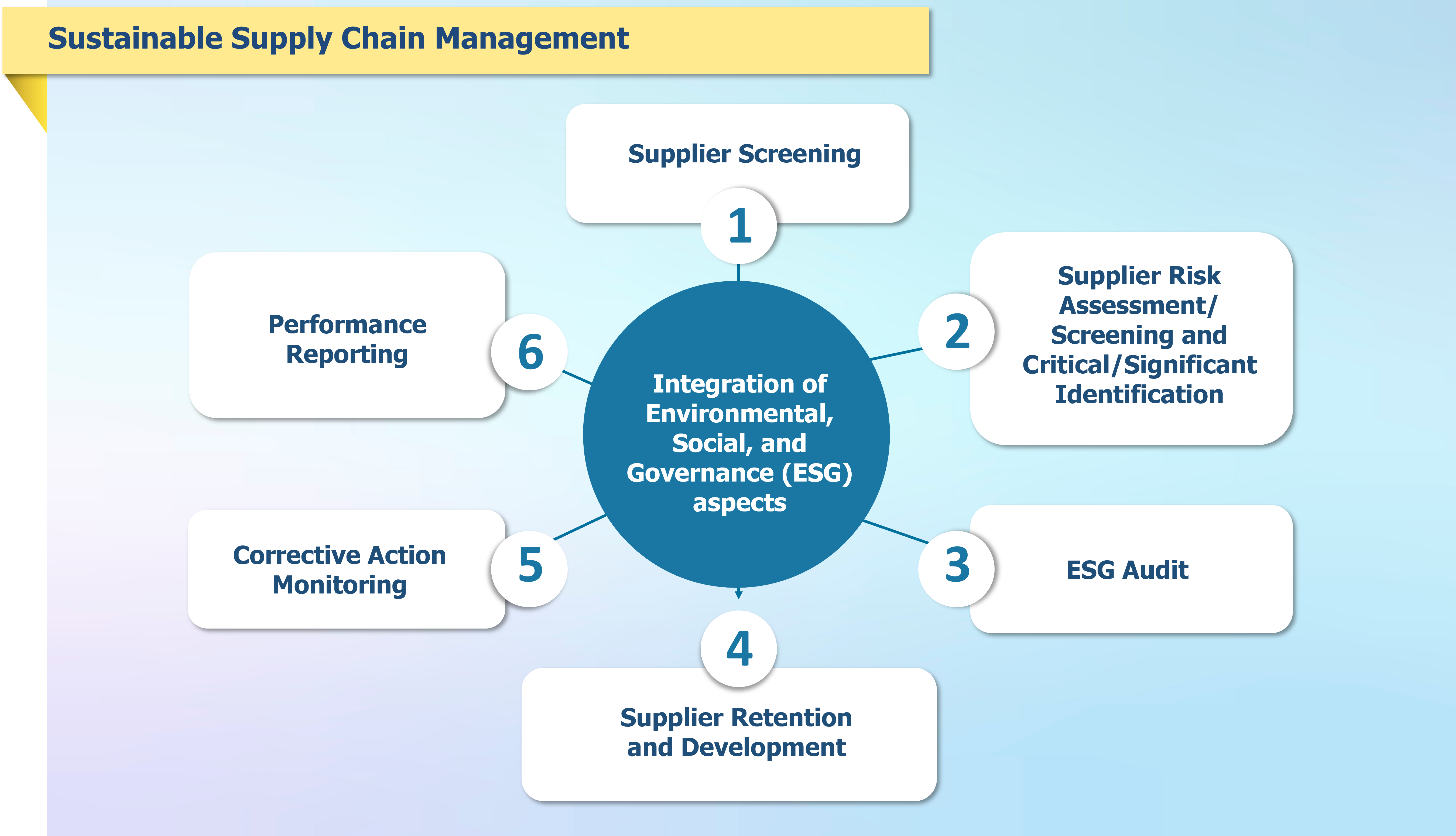
OR has incorporated environmental, social, and good governance (ESG) considerations throughout the procurement process as part of our supply chain management strategy. ESG Criteria is required in procurement processes and contracts are, for example, Occupational, Health, and Safety (OHS), risk and crisis management, and energy management.
1. Supplier Screening
OR screens and selects suppliers based on environmental, social, ethical, and business relevant considerations. In the preliminary step, all suppliers wishing to be registered on the OR’s Approved Vender List (OR AVL), which is Approved Supplier List, must submit a document declaring that they meet OR’s criteria that called a “Pre-Qualification (Pre-Q)” for supplier screening consideration. The Pre-Qualification (Pre-Q) criteria covers various aspects, such as company registration status, financial status, standards for quality, safety, occupational health, and environment as well as sustainability policy and management. Additionally, suppliers are required to complete a supplier self-assessment questionnaire (SAQ), which will be one of the criteria of the pre-qualification (Pre-Q) for supplier assessment.
The questions in the ESG self-assessment questionnaire (SAQ) cover issues related to environmental, social, governance, human rights, and business-relevant aspects. will review the Preliminary Qualification (Pre-Q) documents and the supplier’s ESG Self-Assessment Questionnaire (SAQ). Additional supporting documents may be requested, such as certificates for quality management systems (ISO 9001), environmental management (ISO 14001), and occupational health and safety (ISO 45001), to verify and confirm the supplier’s qualifications.
For the ESG self-assessment results according to the SAQ, suppliers must score above 60% to pass the criteria and be eligible to be listed on OR’s Approved Vendor List (AVL). If a supplier scores below 60% in ESG, they will have the opportunity to make improvements and can seek guidance from OR’s procurement department. Suppliers may then make the necessary corrections and reapply for OR’s Approved Vendor List in the next registration cycle.
The ESG self-assessment results will be integrated with other evaluation criteria in the supplier selection process. Additionally, suppliers whose performance evaluations fall below the minimum standards may be removed from the vendor list or have their contracts terminated. This ensures that suppliers delivering goods or services to OR demonstrate sustainability performance that aligns with OR’s requirements and expectations.
Hence, suppliers with better ESG performance have a higher chance of being selected for OR’s Approved Vendor List and contract awards (due to their better ESG scores). This demonstrates that OR screens and evaluates all suppliers (100%) in the procurement and contracting process using the aforementioned ESG criteria. Suppliers can also engage in discussions with OR to address any deficiencies and make necessary improvements to fully meet the required criteria. This ensures that suppliers can operate efficiently and in compliance with OR’s requirements.
In 2024, from 715 Tier-1 suppliers, a total of 11 Strategic/Significant/Critical Suppliers submit ESG self-assessments questionnaire (SAQs), accounting for 100% of all Strategic/Significant/Critical Suppliers.
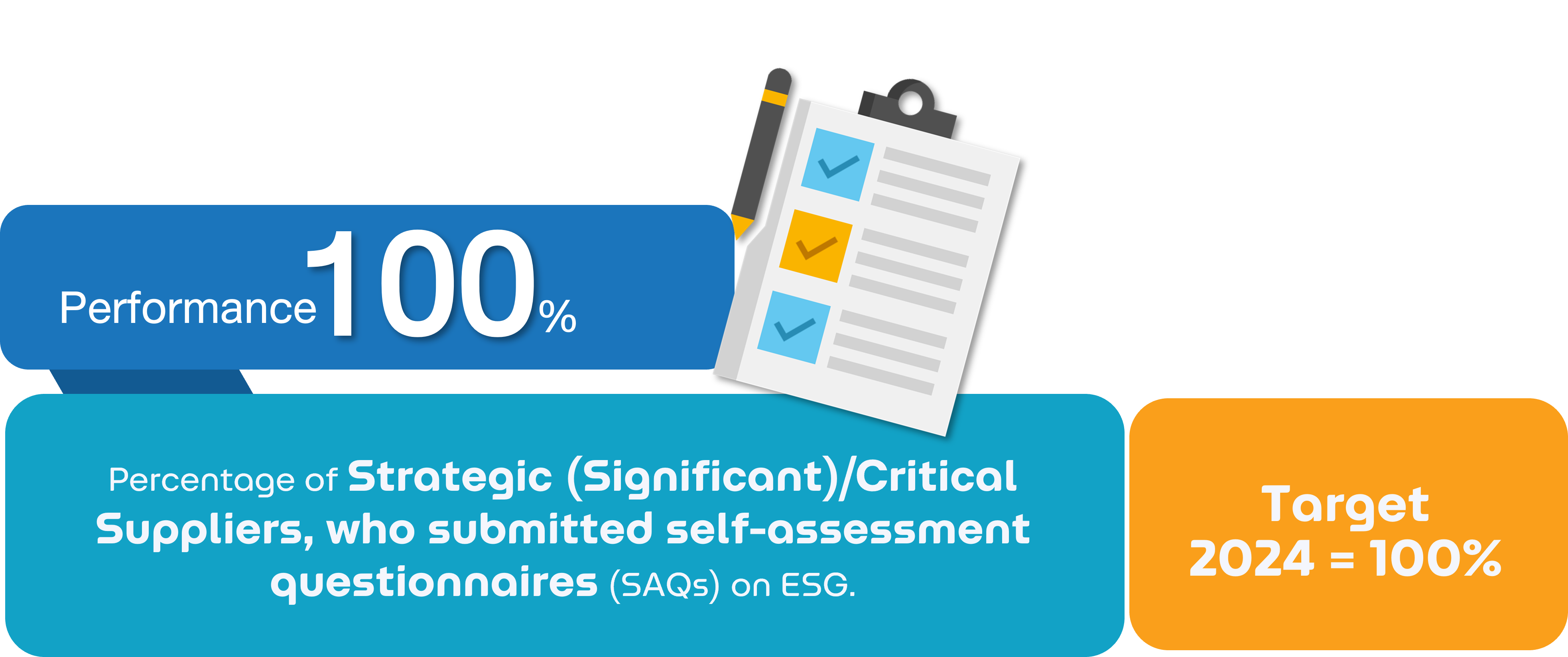
After suppliers have passed the qualification screening process for each business category set by OR and have been registered in the Approved Vendor List, they will be eligible to bid on work within the published categories.
During the bidding process, each internal OR’s procurement unit can select criteria for selecting suppliers. This involves evaluating criteria related to Price-Performance criteria, as well as sustainability indicators beyond OR’s standard product and service quality requirements, such as labor management systems and greenhouse gas reduction initiatives. These sustainability aspects are then converted into scores for each supplier. However, the proportion of sustainability considerations depends on t the nature of the work, products, or services being procured and their relevance to key sustainability issues. Therefore, suppliers whose operations align with OR’s sustainability evaluation criteria will receive additional points, increasing their chances of selection compared to other suppliers with similar price scores.
2. Supplier Risk Assessment/Screening and Critical/ Significant Supplier Identification
OR conducts a risk assessment of environmental, social, governance and categorizes suppliers continuously, considering information and trends at the country risks, sector risks, and product and service type (Commodity) risks. The key points for assessing supplier risks include:
- ESG (Environmental, Social, and Governance) Risk Assessment covers issues related to the environment, social, governance, and business relevance topics with examples as follows:
Environment (E) | Social (S) | Governance (G) | Business Relevance |
|---|---|---|---|
• GHGs Emissions
• Air Pollution • Energy Management • Water and Wastewater Management • Waste and Hazardous Materials Management • Ecological impact • Sustainable Raw Material Sourcing • Circular Product Life Cycle • Deforestation Prevention and Protection | • Human Rights
• Forced Labour • Child Labour • Working Hours • Wages and Benefits • Fair Treatment • Social Diversity and Inclusion • Non-discrimination and Equality • Occupational Health and Safety • Community Relations • Fire Safety • Industrial Hygiene • Customer Welfare and Satisfaction • Human Capital Development • Labor Practices • Employee Engagement | • Anti-corruption and Bribery Implementation
• Fair Competition • Transparent Reporting Mechanism | • Delivery of products and/or services (quality, efficiency, and performance) |
- The assessment of the Criticality/Business Relevance of suppliers covers issues related to the following factors:
- Type of products and services provided by suppliers.
- Analysis of spending on procurement of products and services in each group (High-volume Suppliers)
- Level of importance of products and services (Critical Component Suppliers)
- Level of risk with a limited number of suppliers (Non-substitutable Suppliers)
OR regularly conducts risk assessment covering global risks, country risks, sector risks, and product and service type risks or commodity risks raised from the use of suppliers. The risks are summarized below:
- Global Risk: The risk landscape in 2024 consists of geopolitical conflicts or wars causing energy price fluctuations, prolonged geopolitical tensions leading to disruptions in the global supply chain and trade, increasing and expanding international trade barriers, a natural resource crisis, and growing food insecurity, including food shortages and limited access to quality food.
- Country Risk: The vulnerability caused by rising household debt, which pressures consumption, inconsistent fiscal policies for economic stimulation, volatile and rapidly appreciating Thai Baht, as well as natural disasters in various areas across Thailand.
- Sector Risk: OR consider sector risks for negative impacts in two sectors including energy and retail businesses. The top risks are volatile oil prices, risks to image and reputation, and rapid changing consumer trends.
- Commodity Risk: Coffee beans are at the core of Café Amazon’s business. The shortage of coffee beans from the intensifying climate change and biodiversity loss, poses a major risk to Café Amazon’s operations, leading to higher costs. Therefore, OR has developed sourcing strategies through various channels, including expanding the supply chain to upstream sources, such as the Amazon Park project, to secure an adequate supply of raw materials in the future.
OR conducts assessments Strategic/Significant/Critical suppliers and those identified as having high-risk ESG annually. This assessment covers both Strategic/Significant/Critical Tier 1 Supplier and Critical Non-Tier 1 Supplier. OR’s supplier types are defined from the risk level into 4 types: (1) Strategic/Significant/Critical Suppliers, (2) Key Suppliers, (3) Managed Suppliers, and (4) Routine Suppliers. OR has established strategies and guidelines for management as follows:
Supplier Group | Definition | Management Approach | Management Tools |
1. Strategic (Significant/Critical) Supplier | Suppliers/contractors with activities associated with high ESG risks that may cause severe impacts on suppliers themselves, and OR, and expand to surrounding communities, that leading to potential impacts on OR’s business and corporate image. | Develop long-term business relationships and actions to enhance the potential of doing business together and creating added value |
|
| 2. Key Suppliers | Suppliers with activities Associated with moderate ESG risks that may cause impacts on OR, both in terms of business and/or corporate image. | Develop long-term relationships to control costs, reduce risks, and maintain the competitive level |
|
3. Managed Suppliers, | Suppliers with activities associated with low ESG risks that may have moderate impacts on OR and outside of the organization. | Maintain relationship based on performance and manage costs and risks according to the needs of the suppliers, and monitor performance. |
|
4. Routine Suppliers | Suppliers with activities associated with low ESG risks that may have low impacts on OR and outside of the organization. | Maintain relationship based on performance and manage costs and risks according to the needs of the suppliers. |
|
OR has an assessment of supplier ESG risks and supplier prioritization. In total, OR has 11 strategic/significant/critical suppliers, accounting for 98.30% of the share of total procurement spent. OR has 1 strategic/significant/critical non-tier-1 supplier and 11 Strategic/Significant/Critical Tier 1 Suppliers. Therefore, there are a total of 12 strategic/significant/critical suppliers both tier 1 and non-tier 1.

3. Supplier Environmental, Social and Governance Audit (ESG Audit)
OR requires all petroleum product transportation service providers under OR’s main contract to undergo an annual assessment of their petroleum product transportation operations.
Additionally, every supplier classified as a Strategic/Significant/Critical Supplier must undergo a sustainability operation assessment every three years to verify compliance with the SSCoC. The assessment will be conducted according to the “OR Supplier ESG Assessment Protocol”, referencing international ESG standards, including SMETA, ISO9001, ISO14001, ISO45001, and SA8000, as well as UN Guiding Principles on Business and Human Rights. This protocol covers various ESG aspects of supplier operations, such as environmental management systems and occupational health and safety management systems. OR establishes five main approaches to supplier ESG assessment:
- Self-Assessment: Suppliers evaluate themselves by completing a self-assessment questionnaire, providing essential supporting documents. This method is applicable to all Strategic/Significant/Critical suppliers.
- Desk Assessment: Assessment based on publicly available information and an examination of suppliers’ various documents. This method is utilized for all Strategic/Significant/Critical suppliers.
- Online Assessment (2nd Party): Performance assessment conducted by consultants, external assessor, or OR’s procurement unit through online interviews/audit. This method is utilized for all Strategic/Significant/Critical suppliers.
- Onsite Assessment (2nd Party): Performance assessment conducted by consultants, external assessor, or OR’s procurement unit through at-site of operation audit. This method is utilized for all Strategic/Significant/Critical suppliers, especially suppliers with high ESG risk.
- Onsite Assessment (3rd Party): Strategic/Significant supplier’s performance assessment is carried out by reviewing documents or evidence of international certification that obtained from accredited bodies. Examples are as follows.
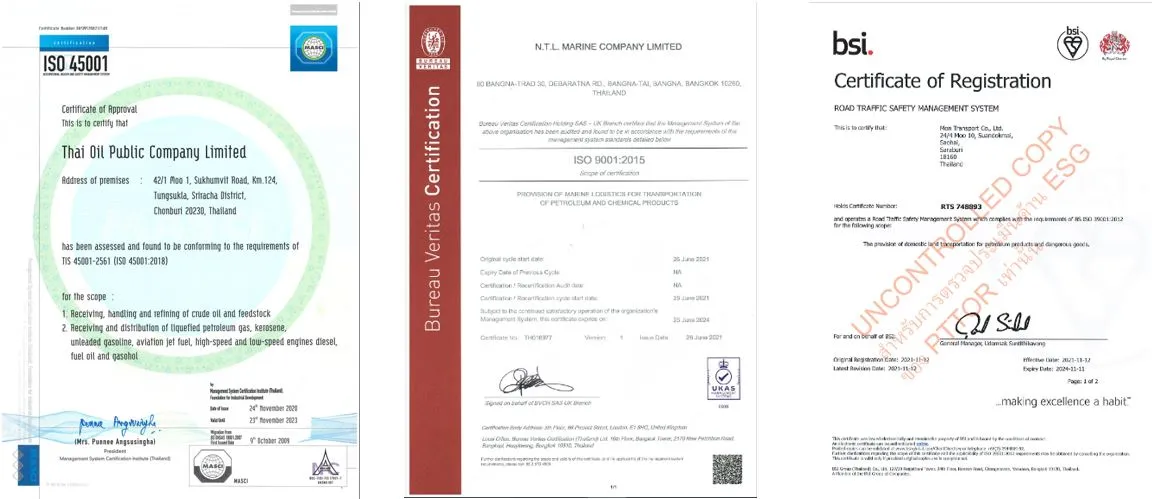
Example of certifications obtained from accredited bodies
OR supplier ESG assessment is categorized into three criteria as follows:
- Business Governance: With the weight 34% consists of Business Continuity Management, Supply Chain Management, Quality Standards, Compliance with Law, Code of Conduct and Anti-corruption, Risk Management.
- Environment: With the weight 31% consists of Environmental Management, Impact on Environmental and Eco-efficiency.
- Social: With the weight of 35% consists of CSR, Health and Safety, Emergency prevention and response, Labour Relations and Human Rights.
If suppliers’ issues are detected, the procurement unit first communicates the findings to the suppliers. The suppliers are then required to develop a corrective action or improvement plan, which should include clearly defined measures to address and prevent deficiencies, along with a specified time frame for completion.
At the beginning of 2024, an assessment of suppliers involved in procurement in 2023 revealed that there are a total of 11 Strategic/Significant/Critical suppliers. Out of these, 9 suppliers participated in the On-site/Online Assessment, While the remaining 2 Strategic/Significant/Critical suppliers were assessed in the past 3 years and received good results. As a result, these 2 suppliers were exempt from annual evaluations in accordance with OR’s supplier management guidelines. In conclusion, all strategic/significant/critical suppliers, totaling 11 suppliers, have successfully undergone sustainability assessments, accounting for 100% of all strategic/significant/critical suppliers, meeting the established target.
Key performance indicators | 2024 Targets | 2024 |
| Percentage of Strategic/Significant/Critical suppliers audited for environmental, social, and governance (ESG) risks in the past year, including document reviews, online and onsite assessment/audit (2nd party), along with consideration of documents or evidence of international certification that obtained from accredited bodies (3rd party) | 100% | 100% |
| Percentage of Strategic/Significant/Critical suppliers assessed for environmental, social, and governance (ESG) risks over the past three years | 100% | 100% |
In this regard, The sustainability performance assessment of suppliers involved in procurement in 2023 was conducted through both online and on-site assessment in 2024. From the assessment, revealed that 1 supplier had significant ESG-related risks or impacts. The key issues identified are as follows:
Key issues | Recommendations |
| Human Rights | Conduct human rights due diligence, communicate human rights policies, and determine mitigation measures. |
| Environmental Management | • Applying for environmental management system certification according to the international standard ISO 14001 or other equivalent certification. |
OR has an internal coordination and management systems to ensure that suppliers are informed of assessment/audit results, received advice on correcting defects and participate in continuous improvement and development efforts. Peer benchmarking on ESG topics which include good practices from Peers are also provided as part of the communication.
In 2024, OR communicated improvement recommendations and supported 1 supplier in implementing a corrective action plan. These 1 supplier, accounting for 100% of those identified with ESG-related risks or impacts, have developed and implemented corrective action plans.
From the Supplier ESG Audit, the results are the following items below:
Supplier | Result |
| Strategic (Significant)/ Critical Supplier | • Audit result communication to supplier 100% |
In addition to monitoring the ESG performance of Strategic (Significant)/Critical suppliers, OR conducts truck and ship transport assessments annually, following the PTT Group Road Safety Management Guideline for truck transport and using the Tanker Management and Self-Assessment (TMSA) criteria for ship transport assessments. The topics of assessment also include QSHE management operations. Accordingly, OR communicates topics that need to be improved, along with suggestions for transporters to develop their capacity according to the guidelines specified in the assessment criteria and for transport contractors to deliver according to contract.
4. Supplier Retention and Development
OR supports suppliers in developing sustainable practices and aims to maintain positive relationships with them. For suppliers found to have defects during audit OR will communicate and require them to plan corrective actions and improve their operations. OR provides appropriate support to each supplier. whether it be communication, activities, and initiating various projects to promote opportunities for suppliers to improve their ESG practices. For example, annual supplier seminars, supplier training, and capacity building programs specific to each business, etc
For more information, please refer to the Performance section.
5. Corrective Action Monitoring
OR monitors the results of corrections made by suppliers, with the responsible units specifying and tracking progress. Suppliers are required to report the progress of their corrections and improvements in addressing issues identified every three months. The results of these corrective actions are reported to organizational management reviews, and reports are presented to management and committees at various levels.
Gaps identified from ESG audit will be communicated and discussed with suppliers to develop preventive and corrective action plans. Example are provided as follows:
Criteria | Gap Topic | Examples of corrective action/improvement plans |
|---|---|---|
Business and Governance | Business Continuity Management system (BCM)
– Business Continuity Management systems (BCM) and practices for planning and preventing business interruptions have not been implemented. However, no vendors experienced business disruptions. | – Create plans and guidelines to prevent business disruptions.
– Plan to implement a business continuity management system and undertake certification in the future. |
Environment | – There has not yet been found to set targets or create projects related to ecological efficiency, such as greenhouse gas emissions reduction projects. Reduce waste generated from operational projects Including tracking performance results | – Plan to implement a business continuity management system and undertake certification in the future. |
Social | Human Rights
– There has not been a comprehensive Human Rights Due Diligence risk assessment within the past 3 years.
– There are no measures to correct, reduce risks, or alleviate human rights impacts/risks. | – Study and assess risks related to human rights due diligence.
– Set corrective measures to reduce risks or mitigate impacts/risks. |
In 2024, All suppliers successfully completed their corrective action plans. There was no risk of suppliers’ contract cancellation or termination due to ESG-related risks or impacts.
6. Performance Reporting
Progress on implementation of the supply chain management strategy is regularly reported to management and the Board of Directors. At the management level, performance is reported to the CEO through the OR Group Quality, Safety, Health and Environment Management Committee (OR QSHE GMC) and the OR Management Committee (ORMC), respectively. At the Board level, reports are submitted to the Corporate Governance and Sustainability Committee (ORCGS) and the Sustainable Development Committee (SD Committee). Additionally, information may be included in the annual sustainability report or on the Company’s website.
Performance
Supplier Capacity Building Program for each Business Group
1) Annual supplier seminars (2024 OR Supplier Day)
OR holds annual supplier seminars to strengthen relationships, communicate its strategies and policies, particularly the company’s sustainable procurement strategy, exchange knowledge, share useful information, discuss relevant market conditions, and communicate news and government policies that may affect the business operations of both OR and suppliers. It is also an opportunity for OR employees, operators, and executives to receive feedback on issues and suggestions directly from suppliers to further improve OR’s operations and create opportunities for doing business together in the future. This will help develop sustainable business operations.
This year, the seminar was held on 29 March 2024, under the theme “Lean and Sustainable Procurement” to help suppliers understand relevant policies and stay informed about changes at OR, including the adoption of the SAP Ariba system for managing procurement process with suppliers. The seminar also provided knowledge on sustainability, including good governance and anti-corruption practices for suppliers. There are more than 150 companies participated in the event.
In addition, OR communicated its new procurement process concept based on the Sustainable, Lean, and Procurement (SLP) framework.
- S: Sustainable focuses on making the procurement process sustainable in terms of good governance, justice, transparency, and providing equal opportunities for all suppliers to participate in the bidding process. It also emphasizes responsibility for society, environment, and stakeholders across all dimensions.
- L: Lean focuses on making the procurement process flexible to support business operations and respond to changes in consumer behavior and rapidly evolving market conditions.
- P: Procurement at OR emphasizes both sustainability and operational agility.
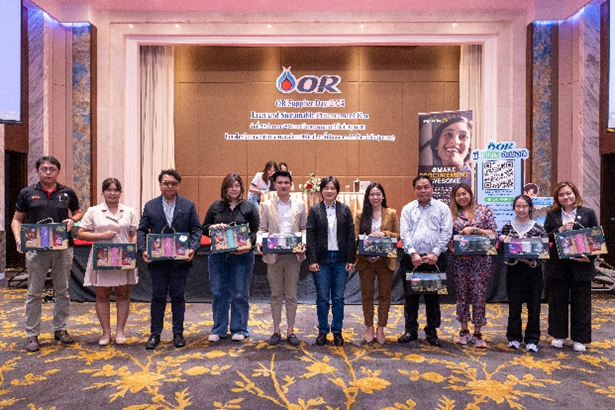
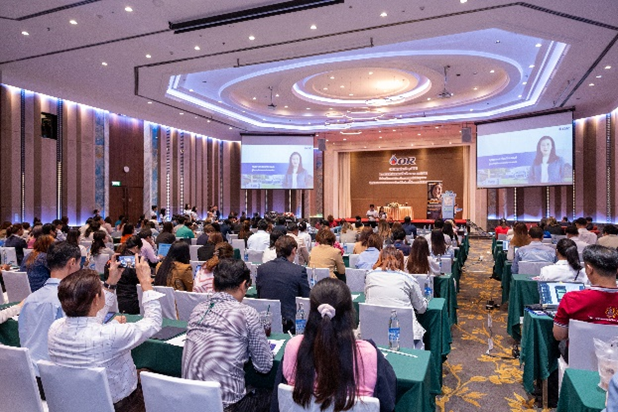
2) Strengthening Safety Performance Amongst Petroleum Products Suppliers and Transporters
OR focuses on enhancing safety capabilities throughout the petroleum product transportation process. This is achieved through in-depth training the transporters in the safe handling of petroleum products, adhering to standards and laws. Moreover, OR also supports each transporter in installing and utilizing In-Vehicle Monitoring Systems (IVMS) technology. The IVMS technology records travel data of the transport vehicles, used for controlling, supervising, and overseeing the transportation of petroleum products. This ensures that every transporter aligns their operations with the expected standards and safety requirements in transportation. (Read more on Occupational Health and Safety)
In 2024, the Petroleum Transport and Delivery Safety Development Working Group conducted random inspections the operation of contracted transporters. This included random checks on the operation of the transporters’ IVMS control centers, random inspections of coordinators, random interviews with drivers, and feedback exchanges between OR and the transporters. This was done to ensure confidence that the transporter’s operations comply with OR’s standards and safety policies.
In terms of knowledge management, OR conducted a project to control and promote safety measures for high-risk routes in collaboration with transport operators. The project focuses on helping transport operators understand risk assessments and effectively control and prevent accidents during transportation. Additionally, it aims to promote transport vehicle standards by developing guidelines for pre-contract vehicle inspections conducted by vehicle condition managers. OR also provided knowledge-sharing materials and conducted monthly monitoring to ensure that petroleum product vehicles comply with OR’s standards and legal requirements
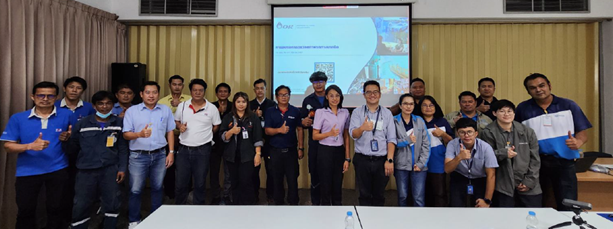
In terms of transport safety management, OR conducted assessments of transport operators following the PTT Group Road Safety Management Guideline at the operators’ offices and fleet locations. The assessment findings were then communicated to the operators, along with recommendations for improvement and development. In addition, the assessment results were analyzed to identify the operators’ strengths and areas for improvement. OR organized workshops to exchange knowledge and share best practices among transport operators in each area of the PTT Group Road Safety Management Guideline (5 Pillars). These efforts aimed to enhance knowledge and improve transport management practices for both the operators and OR.
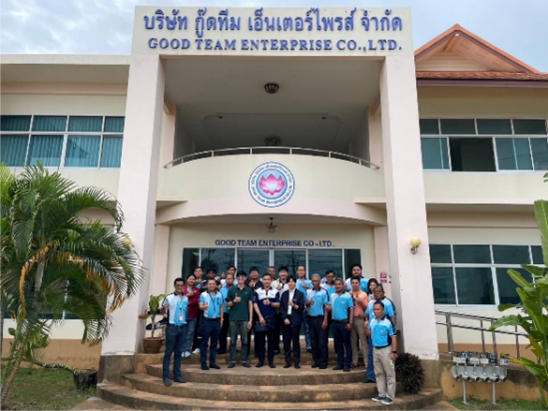
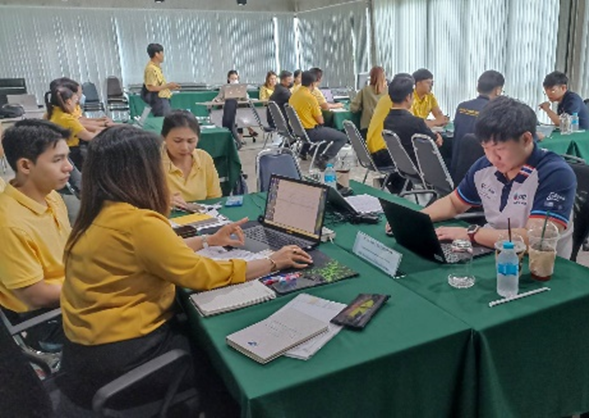
3) 2024 Petroleum Product Transporters Seminar
OR organized the 2024 Petroleum Product Transporters Seminar to communicate OR’s policies, directions, and goals, foster mutual understanding of business operations between OR and its transport partners, and exchange knowledge to improve the efficiency of petroleum product transportation operations. Safe transportation practices were promoted through various activities, such as workshops on safety enhancements for high-risk routes and best practice sharing sessions on transport management based on the PTT Group Road Safety Management Guideline.
Awards were also presented to transport operators with outstanding performance in transport operations in 2023. The awards aim to emphasize the importance of improving efficiency and enhancing the capabilities of transport management. They also seek to promote and motivate transport operators to continually develop and maintain transport operation standards in compliance with contractual requirements and regulations, as well as to ensure safe transportation practices.
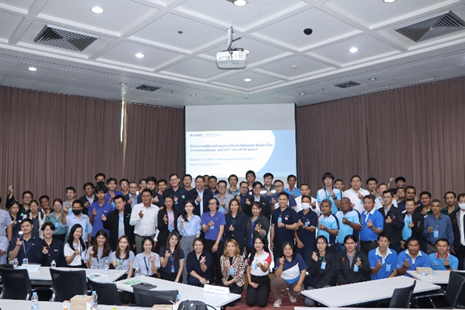
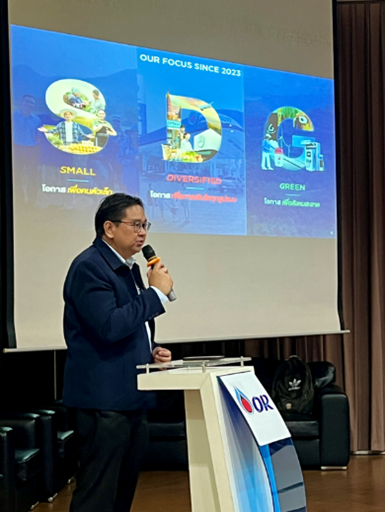
OR, in collaboration with the PTT Group and the Oil Industry Environmental Safety Group Association (IESG), presented awards to petroleum product transport contractors and drivers with outstanding safety performance. The awards aim to promote, motivate, and encourage a commitment to safe transportation practices, fostering a sense of responsibility toward society, communities, and the environment. The selection criteria included transport contractors and drivers with no major accidents, no complaints, and no violations of laws or contracts. In addition, transportation statistics and driving behavior monitored through the IVMS system were taken into account. In 2024, 3 transport contractors and 18 drivers received these awards.
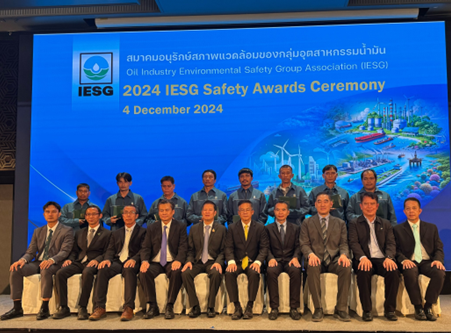
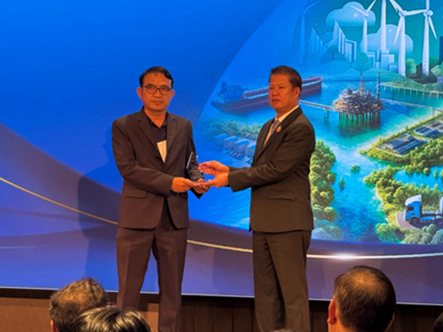
4) 2024 Seminar for Petroleum Product Suppliers and Business Partners
OR organized the Seminar for 2024 Petroleum Product Suppliers and Business Partners on 14–15 November 2024, in Prachuap Khiri Khan province. The event was attended by suppliers and business partners from 9 companies in the petroleum refinery business and Category 7 oil traders, who produce and distribute refined oil, LPG, and asphalt products, totaling 61 attendees.
The seminar aimed to strengthen relationships and facilitate knowledge exchange on energy topics, an overview of petroleum product demand and supply, relevant market trends, and updates on government policies affecting the operations of OR, suppliers, and partners. In addition, it provided an opportunity for OR employees and executives to receive direct feedback, concerns, and recommendations from suppliers and partners to further improve and enhance OR’s operations, as well as create opportunities for sustainable growth and collaboration in the future. Additionally, OR conducted the CSR activity “Shaping and Shooting Seeds of Goodness” at Khao Nang Phanthurat Forest Park, Phetchaburi, to raise awareness and promote social and environmental contributions together with suppliers and partners. Furthermore, OR held a partnership meeting with refinery suppliers to explore and integrate the Voice of the Customer into product development to meet evolving customer demands and promote sustainable products.
Moreover, in 2024, OR and refineries under PTT Group joined forces to combine strengths, enhance capacity, and improve competitiveness for sustainable growth, and promote efficient management across the entire value chain to address market demands for environmental responsibility. As Thailand’s leading aviation fuel distributor, OR is committed to sharing its expertise and experience with refineries under PTT Group to study and produce Sustainable Aviation Fuel (SAF). This initiative supports both domestic and international airlines in reducing their environmental impact and aligns with Thailand’s Net Zero goal by 2065, as well as future standards set by ICAO and IATA.
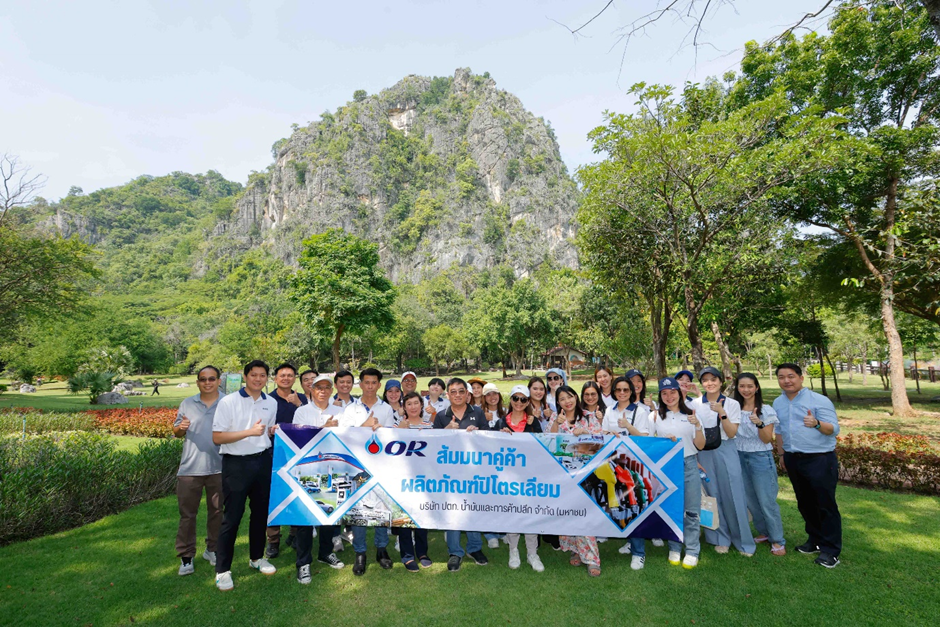
5) OR’s ESG Best Practices Manual for Suppliers
OR has developed the Best Practices Manual for each business to serve as a guideline for suppliers in improving their sustainability operations across environmental, social, and governance (ESG) dimensions. The guideline includes examples of best practices as well as various technical information that suppliers can apply to enhance and continuously improve their sustainability efforts.
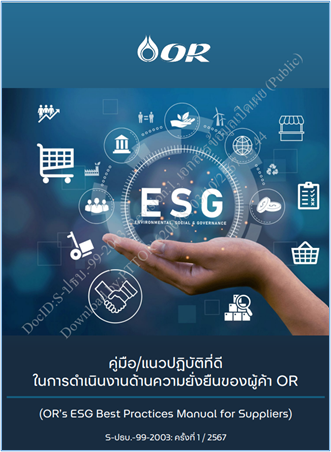
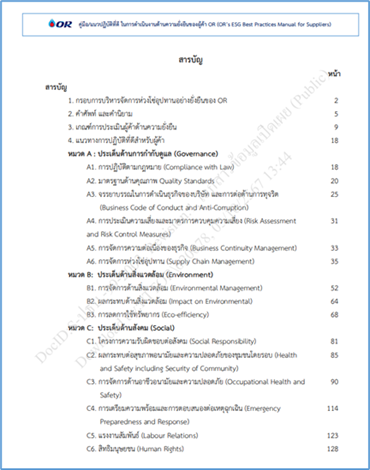
6) Carbon Footprint & Carbon Credit Knowledge Sharing for Suppliers
OR conducted knowledge sharing on Carbon Footprint & Carbon Credit with petroleum product shipping companies as well as other affiliated businesses. OR shared its experience in sustainability operations and provided guidance on calculating, collecting data, and reporting the organization’s Carbon Footprint, carbon credit trading, and voluntary greenhouse gas reduction projects under Thailand’s T-VER standard. In addition, OR addressed inquiries, facilitated discussions, and provided advice and recommendations to help suppliers apply the knowledge to further enhance their sustainability operational capabilities.
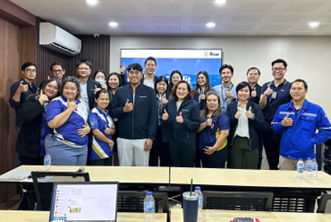
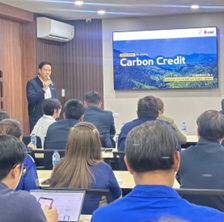
7) Sustainable Coffee Project
OR has set a goal of raising the standards of working conditions and coffee production among coffee farmers to meet the Café Amazon standard. This standard has been implemented with farmers participating in the Sustainable Coffee Project in areas designated for promoting Arabica and Robusta coffee production.
Driven by a strong commitment and a key objective to expand knowledge of coffee cultivation and production with network partners across various areas, OR initiated an MOU with the Royal Project Foundation since 2014. This initiative supports coffee farmers and individuals interested in coffee cultivation who lack opportunities to develop sustainable skills and knowledge. It aims to produce high-quality coffee that meets Café Amazon’s roasting standards while promoting environmental conservation of soil and water systems. Additionally, the project establishes a stable connection for purchasing coffee beans under a Fair Trade system, ensuring farmers receive a fair price and steady income that aligns with living wages, ultimately improving their quality of life. OR also plans to expand this pilot project to other underserved areas that currently lack support from any organizations.
OR operated in Chiang Rai province from 2018 to 2024, supporting the procurement of green coffee beans from various locations. At Ban Pha Lang, Huai Chomphu subdistrict, Mueang district, 92 farmers participated in the project, generating a total value of 67.2 million THB across more than 1,200 rai of Arabica coffee plantations. Similarly, at Ban Pang Khon, Huai Chomphu subdistrict, Mueang district, 74 farmers were involved, contributing to a total value of 89 million THB across over 1,400 rai of coffee plantations. Additionally, OR supported the purchase of green beans from Ban Sam Soong, Ban Huai Mak, Ban Huai Yuak, and Ban A-To in Mae Salong Nai subdistrict, Mae Fah Luang district, involving 99 farmers and generating a value of 54.8 million THB across more than 1,900 rai. Altogether, these efforts created a combined income of over 211 million THB for farmers across the three areas.
In 2024, OR expanded its knowledge-sharing efforts and operations for the Sustainable Coffee Project through a collaboration with the Department of National Parks, Wildlife and Plant Conservation, covering over 100 rai in Tha Pha subdistrict, Mae Chaem district, Chiang Mai province. The Tha Pha Coffee Farmers Group was established, involving 42 farmers. During the 2023–2024 coffee processing season, which marked the first year of collaboration, OR supported the purchase of coffee products from the farmers, generating over 60,000 THB in income for the group. Additionally, OR partnered with the Ministry of Agriculture and Cooperatives to establish the Khun Kun Local Agricultural Community in Ban Pang Yang and Ban Khun Kun, Phu Kha subdistrict, Pua district, Nan province, involving 50 farmers. The activities focus on practical knowledge development to address real-world challenges and promote coffee cultivation alongside environmental conservation. OR provided farmers with facilities such as nurseries, coffee drying stations, and irrigation systems to enhance their capacity. The project aims to promote coffee cultivation across more than 100 rai.
In 2024, to drive Café Amazon toward becoming a sustainable green business, OR emphasized a holistic approach from upstream to downstream. This included providing knowledge to coffee farmers to help them produce high-quality coffee that meets market standards and purchasing coffee beans from small-scale farmers at Fair Trade prices. A parchment coffee purchasing station was established in Mae Wang district, Chiang Mai province, to support local farmers. Additionally, OR founded a knowledge development institute for member farmers, offering training courses on both fundamental and specialized topics. These courses covered coffee seed cultivation, seedling planting, farm management, pest and disease control, and various coffee processing methods to produce quality yields. The institute also offered courses addressing real-world challenges faced by farmers during coffee cultivation and production, aiming to enhance their capacity and promote sustainable coffee farming practices.
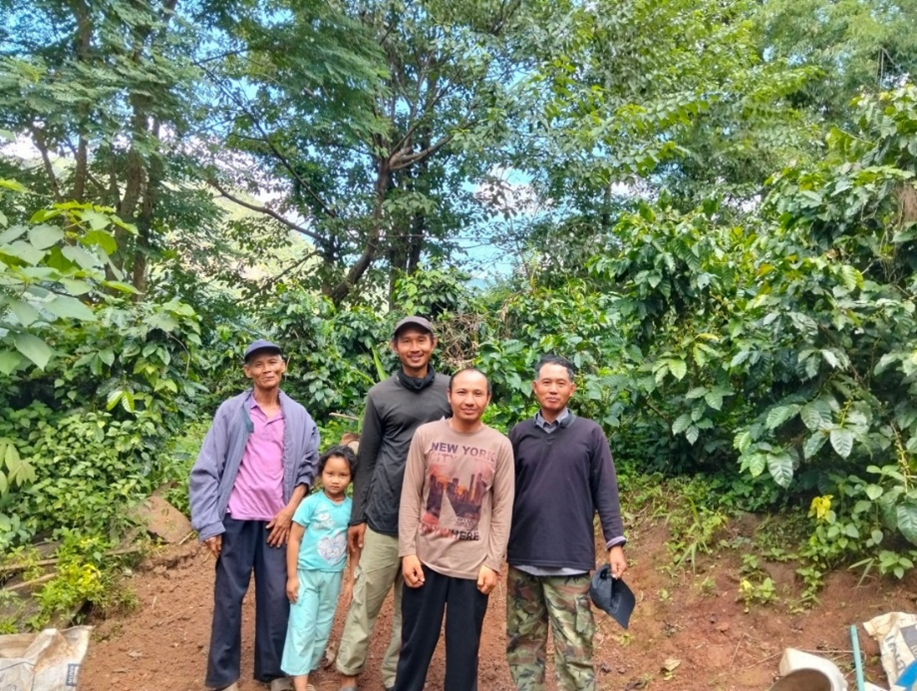
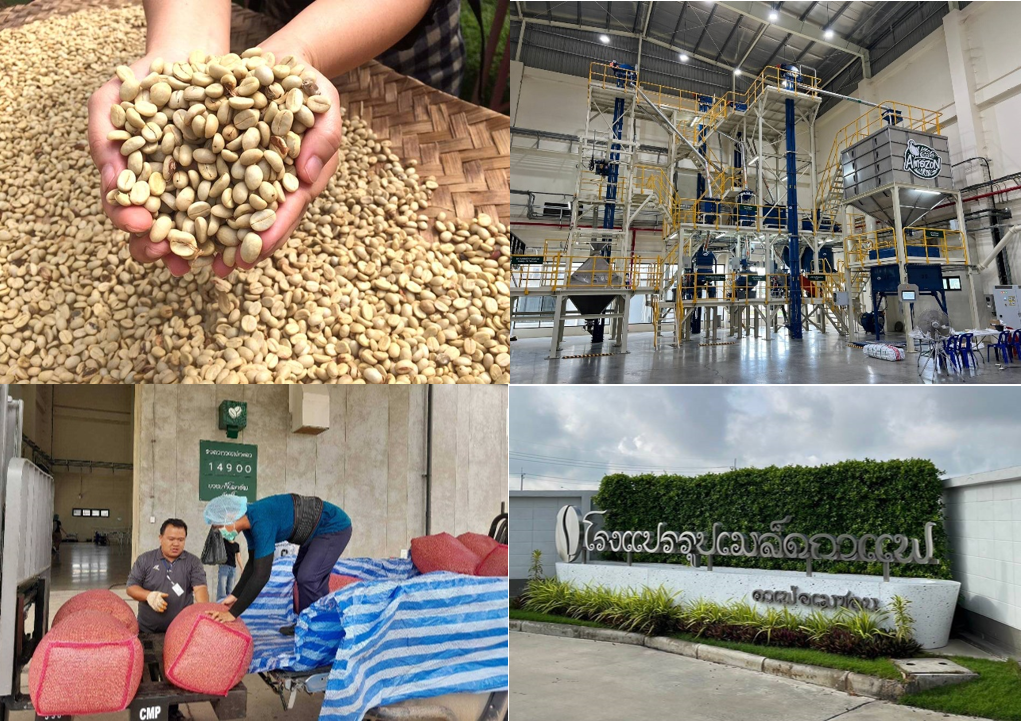
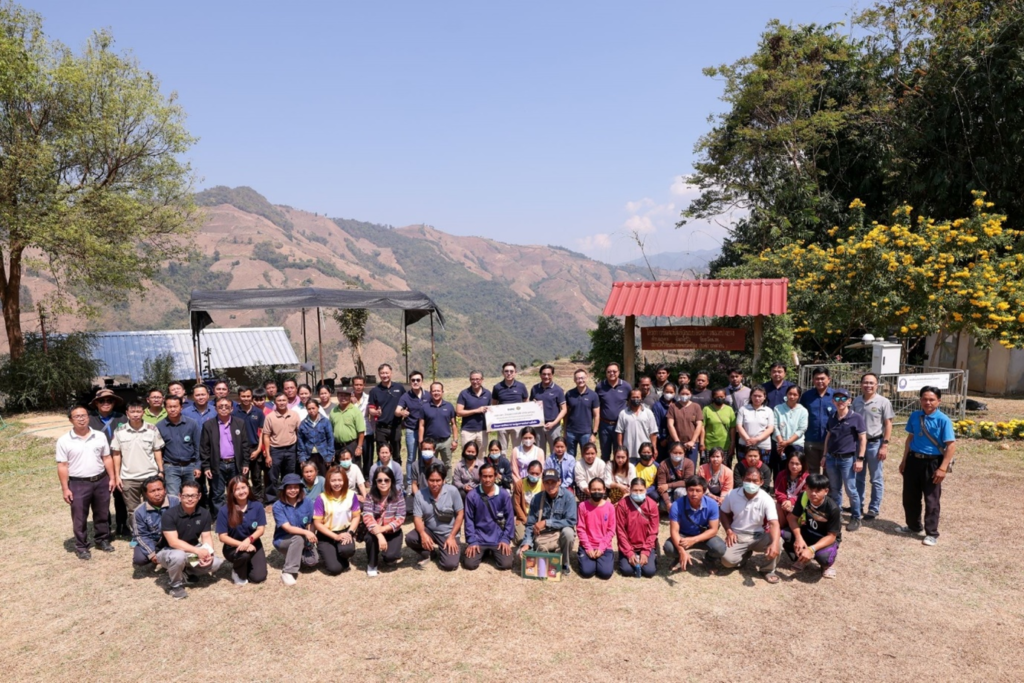
Strengthening Sustainable Procurement Capacity in the Organization
OR organized a training course on “Development of ESG Supplier Auditors
To build an understanding of sustainability among its internal personnel and enable them to become ESG Supplier Auditors for their departments or OR in the future. The ESG Supplier Audit process, which covers the Environmental, Social, and Governance (ESG) dimensions, is an integral part of effective sustainable supplier management. It ensures that business operations across the supply chain do not negatively impact communities, society, or the environment. The training took place on 5 – 6 August 2024, with 39 representatives from relevant business units, procurement units, and sustainability units.
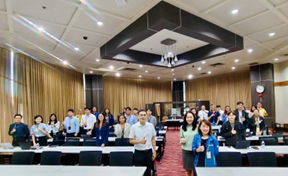
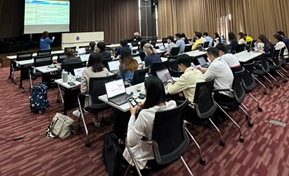
Third Party Verification
In 2024, OR conducted an external audit of its supply chain management activities, conducted by an external auditor (Assurance Statement)
The ESG supplier management process is continuously reviewed to ensure its alignment with the organization’s business strategy and that supplier operations comply with the sustainable practices outlined in the Supplier Sustainability Code of Conduct (OR SSCoC) and the ESG practices established by OR.
Site map
- About
- Organization
- Career
- Oil Business
- - Retail Energy Solution
- - Commercial Business
- Retail Business
- Services
- International Business
- Business Opportunity
- Sustainability
PTT Oil and Retail Business Public Company Limited
555/2 Energy Complex Building B, 12th Floor, Vibhavadi Rangsit Rd., Chatuchak, Bangkok 10900
© 2024 OR Tel : 02 196 5959
